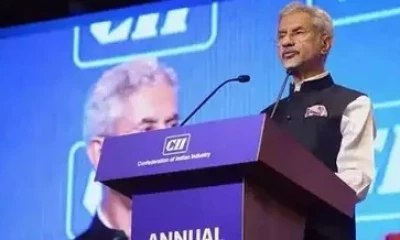External Affairs Minister S Jaishankar highlighted the increasing global demand for Indian skills and talent, noting that developed countries are now showing a keen interest in concluding mobility agreements with Bharat.
“In the era of a knowledge economy, the role of Indian skills and talent is also being reassessed. The nature of technological advancement is itself creating greater demand. But there is also the reality of demographic shortages in developed countries. These trends are manifesting themselves right now in an interest across the world to conclude mobility agreements with Bharat,” stated Jaishankar at the CII Annual Business Summit 2024 in New Delhi.
Jaishankar emphasised the need for fair and transparent treatment of Indian talent globally. “As a global workplace emerges – and believe me, it will grow faster than all of us anticipate – there are some immediate consequences. Expanding the scale and quality of skilling at home becomes an even more urgent imperative. This is very much in line with the Modi Government’s thinking. They are supported by the spread of the innovation and start-up culture as well. Businesses too need to do their fair share in the upgrading of our human resources,” he added.
The EAM addressed the obligation to ensure the safety of Indian citizens abroad, citing recent successful evacuations from Ukraine and Sudan as examples of Bharat’s growing capabilities in this area. “As the global workplace expands, the obligation to secure our citizens abroad will also grow proportionately. Fortunately, this is an area where we have already built capabilities and created SOPs, as evidenced recently in Ukraine and in Sudan. We are also deploying technology more widely for the ease of living of Indians travelling and working abroad,” Jaishankar stated.
Discussing Bharat’s broader goals, Jaishankar outlined the nation’s ambition to become a global hub for innovation, research, and design. “As Bharat contemplate the relevance of the Indian talent with the importance of Make in India, our goal is to make ourselves into a global hub for innovation, research, and design as well. Work in India is the natural outcome, I would say, a supportive basis for Make In India. But it will also have Work for the World as its subset,” he added.
Jaishankar reflected on the global crises stemming from ongoing conflicts like the impact of wars in Ukraine and Gaza, and the resulting 3F crisis of fuel, food and fertilisers. He stressed Bharat’s balanced approach in addressing these challenges. “The world is experiencing a 3F crisis of fuel, food, and fertilisers. In Asia, new tensions have emerged in land and sea as agreements are dishonoured and the rule of law disregarded. Terrorism and extremism have started to consume those who have long practiced it. In many ways, we are actually going through the perfect storm. For Bharat, the task is to mitigate its impact on itself and contribute to stabilising the world to the extent possible. It is this judicious combination of ‘Bharat First’ and ‘Vasudaiva Kutumbakam’ that defines our image as ‘Vishwa Bandhu,’” he concluded.

















